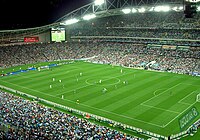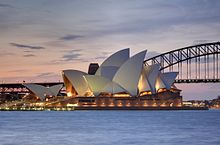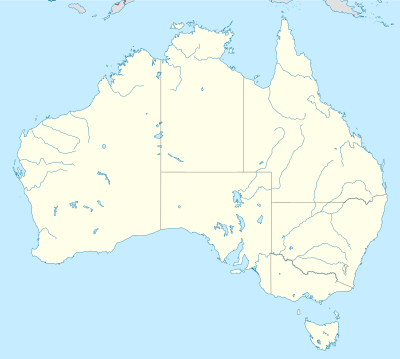2015 AFC Asian Cup: Difference between revisions
| Line 465: | Line 465: | ||
*'''{{UZB}}''': SPORT-UZ{{Citation needed|date=July 2014}} |
*'''{{UZB}}''': SPORT-UZ{{Citation needed|date=July 2014}} |
||
*'''{{PHI}}''': |
*'''{{PHI}}''': |
||
*'''{{NZL}}''': |
|||
==References== |
==References== |
||
Revision as of 21:10, 20 July 2014
| File:2015 AFC Asian Cup crest.png | |
| Tournament details | |
|---|---|
| Host country | |
| Dates | 9–31 January |
| Teams | 16 |
| Venue(s) | 5 (in 5 host cities) |
The 2015 AFC Asian Cup will be the 16th edition of the AFC Asian Cup, an international football tournament organised by the Asian Football Confederation (AFC). For the first time in its history, the tournament will be hosted outside the continent of Asia, by AFC member nation Australia from 9 to 31 January 2015.[1] The winner of the tournament will earn the right to compete for the 2017 FIFA Confederations Cup, which is to be hosted by Russia.
Host selection
Australia was the sole bidder for the hosting rights and was officially named host on 5 January 2011.
“Considering the efforts of the Football Federation Australia in developing the game on their territory and considering also all the achievements that have been made towards the development of football in Australia and to encourage Australia to take steps towards developing the game, I am happy and honoured to announce that the executive committee of the Asian Football Confederation has approved Australia as the host nation of the 2015 AFC Asian Cup,” said then-AFC President, Mohammed Bin Hammam.[2]
Match Ball
The official match ball will be the Nike Ordem.
Qualification
The teams finishing first, second and third in the 2011 AFC Asian Cup, and the host nation for the 2015 competition, receive automatic byes to finals. Should the host nation finish in the top three of the 2011 AFC Asian Cup, the fourth-placed team does not receive an automatic bye.[3] The AFC Challenge Cup acts as a further qualification competition for eligible countries within the emerging and developing category of member associations. The winners of the AFC Challenge Cup competitions in 2012 and 2014 qualify automatically to the 2015 AFC Asian Cup finals.[4] The remaining spots are available for the teams competing in the main Asian Cup preliminaries. The AFC decided that the 20 teams involved in the qualifiers would be drawn into five groups of four teams each. The top two teams from each group and one best third-placed team from among all the groups would qualify for the 2015 AFC Asian Cup.[5]
Qualified teams
The following sixteen teams qualified for the tournament.
| Country | Qualified as | Qualified on | Previous appearance in tournament1 |
|---|---|---|---|
| Hosts2 | 5 January 2011 | 2 (2007, 2011) | |
| 2011 AFC Asian Cup winners | 25 January 2011 | 7 (1988, 1992, 1996, 2000, 2004, 2007, 2011) | |
| 2011 AFC Asian Cup 3rd place | 28 January 2011 | 12 (1956, 1960, 1964, 1972, 1980, 1984, 1988, 1996, 2000, 2004, 2007, 2011) | |
| 2012 Challenge Cup winners | 19 March 2012 | 3 (1980, 1992, 2011) | |
| Group D winners | 15 November 2013 | 4 (1988, 2004, 2007, 2011) | |
| Group E winners | 15 November 2013 | 8 (1980, 1984, 1988, 1992, 1996, 2004, 2007, 2011) | |
| Group C winners | 15 November 2013 | 8 (1984, 1988, 1992, 1996, 2000, 2004, 2007, 2011) | |
| Group A winners | 19 November 2013 | 2 (2004, 2007) | |
| Group E runners-up | 19 November 2013 | 5 (1996, 2000, 2004, 2007, 2011) | |
| Group D runners-up | 19 November 2013 | 8 (1980, 1984, 1988, 1992, 2000, 2004, 2007, 2011) | |
| Group B winners | 19 November 2013 | 12 (1968, 1972, 1976, 1980, 1984, 1988, 1992, 1996, 2000, 2004, 2007, 2011) | |
| Group B runners-up | 19 November 2013 | 9 (1972, 1976, 1980, 1984, 1988, 1996, 2000, 2004, 2011) | |
| Group A runners-up | 4 February 2014 | 2 (2004, 2011) | |
| Group C runners-up | 5 March 2014 | 7 (1972, 1976, 1996, 2000, 2004, 2007, 2011) | |
| Best third-placed team | 5 March 2014 | 10 (1976, 1980, 1984, 1988, 1992, 1996, 2000, 2004, 2007, 2011) | |
| 2014 Challenge Cup winners | 30 May 2014 | 0 (debut) |
- 1 Bold indicates champion for that year.
- 2 Australia also obtained 2011 AFC Asian Cup runner-up qualifying position
Venues
The five host cities for the 2015 AFC Asian Cup, Sydney, Melbourne, Brisbane, Canberra and Newcastle, were announced on 27 March 2013, with a total five venues to be used.[6]
| Sydney | Newcastle | Brisbane |
|---|---|---|
| Stadium Australia | Newcastle Stadium | Brisbane Stadium |
| Capacity: 84,000 | Capacity: 33,000 | Capacity: 52,500 |

|

|

|
| Canberra | ||
| Canberra Stadium | ||
| Capacity: 25,011 | ||

| ||
| Melbourne | ||
| Melbourne Rectangular Stadium | ||
| Capacity: 30,050 | ||

| ||
Final draw
The draw for the final tournament was held at the Sydney Opera House on 26 March 2014.[7] The 16 participating teams were drawn into the four groups of the group stage.[8] In preparation for this, the teams were organised into four pots using the March 2014 FIFA World Rankings (rankings beside the qualified teams), with the host nation Australia automatically occupying the A1 position of Pot 1.[9] At the time of the draw, the identity of the 2014 AFC Challenge Cup winners was not known yet, and they were automatically placed into Pot 4.
| Pot 1 | Pot 2 | Pot 3 | Pot 4 |
|---|---|---|---|
|
|
|
|
Squads
Each country will have a final squad of 23 players which must be submitted before the deadline of 30 December 2014.[10]
Group stage

The match schedule was announced on 27 March 2013.[6][11] The winners and runners-up from each group advance to the knockout stage.
- Tiebreakers
The teams are ranked according to points (3 points for a win, 1 point for a tie, 0 points for a loss). If tied on points, tiebreakers are applied in the following order:[10]
- Greater number of points obtained in the group matches between the teams concerned
- Goal difference resulting from the group matches between the teams concerned
- Greater number of goals scored in the group matches between the teams concerned
- Goal difference in all the group matches
- Greater number of goals scored in all the group matches
- Penalty shoot-out if only two teams are involved and they are both on the field of play
- Fewer score calculated according to the number of yellow and red cards received in the group matches (1 point for a single yellow card, 3 points for a red card as a consequence of two yellow cards, 3 points for a direct red card, 4 points for a yellow card followed by a direct red card)
- Drawing of lots
| Key to colours in group tables | |
|---|---|
| Group winners and runners-up advance to the knockout stage | |
Group A
| Pos | Team | Pld | W | D | L | GF | GA | GD | Pts | Qualification |
|---|---|---|---|---|---|---|---|---|---|---|
| 1 | 3 | 3 | 0 | 0 | 3 | 0 | +3 | 9 | Advance to knockout stage | |
| 2 | 3 | 2 | 0 | 1 | 8 | 2 | +6 | 6 | ||
| 3 | 3 | 1 | 0 | 2 | 1 | 5 | −4 | 3 | ||
| 4 | 3 | 0 | 0 | 3 | 1 | 6 | −5 | 0 |
| 9 January 2015 | |||
| Australia |
Match 1 | Melbourne Rectangular Stadium, Melbourne | |
| 10 January 2015 | |||
| South Korea |
Match 2 | Canberra Stadium, Canberra | |
| 13 January 2015 | |||
| Kuwait |
Match 9 | Canberra Stadium, Canberra | |
| Oman |
Match 10 | Stadium Australia, Sydney | |
| 17 January 2015 | |||
| Australia |
Match 17 | Brisbane Stadium, Brisbane | |
| Oman |
Match 18 | Newcastle Stadium, Newcastle |
Group B
| Pos | Team | Pld | W | D | L | GF | GA | GD | Pts | Qualification |
|---|---|---|---|---|---|---|---|---|---|---|
| 1 | 3 | 3 | 0 | 0 | 5 | 2 | +3 | 9 | Advance to knockout stage | |
| 2 | 3 | 2 | 0 | 1 | 5 | 3 | +2 | 6 | ||
| 3 | 3 | 1 | 0 | 2 | 5 | 5 | 0 | 3 | ||
| 4 | 3 | 0 | 0 | 3 | 2 | 7 | −5 | 0 |
| 10 January 2015 | |||
| Uzbekistan |
Match 3 | Stadium Australia, Sydney | |
| Saudi Arabia |
Match 4 | Brisbane Stadium, Brisbane | |
| 14 January 2015 | |||
| North Korea |
Match 11 | Melbourne Rectangular Stadium, Melbourne | |
| China |
Match 12 | Brisbane Stadium, Brisbane | |
| 18 January 2015 | |||
| Uzbekistan |
Match 19 | Melbourne Rectangular Stadium, Melbourne | |
| China |
Match 20 | Canberra Stadium, Canberra |
Group C
| Pos | Team | Pld | W | D | L | GF | GA | GD | Pts | Qualification |
|---|---|---|---|---|---|---|---|---|---|---|
| 1 | 3 | 3 | 0 | 0 | 4 | 0 | +4 | 9 | Advance to knockout stage | |
| 2 | 3 | 2 | 0 | 1 | 6 | 3 | +3 | 6 | ||
| 3 | 3 | 1 | 0 | 2 | 3 | 5 | −2 | 3 | ||
| 4 | 3 | 0 | 0 | 3 | 2 | 7 | −5 | 0 |
| 11 January 2015 | |||
| United Arab Emirates |
Match 6 | Canberra Stadium, Canberra | |
| Iran |
Match 5 | Melbourne Rectangular Stadium, Melbourne | |
| 15 January 2015 | |||
| Bahrain |
Match 13 | Canberra Stadium, Canberra | |
| Qatar |
Match 14 | Stadium Australia, Sydney | |
| 19 January 2015 | |||
| Iran |
Match 21 | Brisbane Stadium, Brisbane | |
| Qatar |
Match 22 | Stadium Australia, Sydney |
Group D
| Pos | Team | Pld | W | D | L | GF | GA | GD | Pts | Qualification |
|---|---|---|---|---|---|---|---|---|---|---|
| 1 | 3 | 3 | 0 | 0 | 7 | 0 | +7 | 9 | Advance to knockout stage | |
| 2 | 3 | 2 | 0 | 1 | 3 | 1 | +2 | 6 | ||
| 3 | 3 | 1 | 0 | 2 | 5 | 4 | +1 | 3 | ||
| 4 | 3 | 0 | 0 | 3 | 1 | 11 | −10 | 0 |
| 12 January 2015 | |||
| Japan |
Match 7 | Newcastle Stadium, Newcastle | |
| Jordan |
Match 8 | Brisbane Stadium, Brisbane | |
| 16 January 2015 | |||
| Palestine |
Match 15 | Melbourne Rectangular Stadium, Melbourne | |
| Iraq |
Match 16 | Brisbane Stadium, Brisbane | |
| 20 January 2015 | |||
| Japan |
Match 23 | Melbourne Rectangular Stadium, Melbourne | |
| Iraq |
Match 24 | Canberra Stadium, Canberra |
Knockout stage
In the knockout stage, extra time and penalty shoot-out are used to decide the winner if necessary.[10]
| Quarter-finals | Semi-finals | Final | ||||||||
| 22 January – Melbourne | ||||||||||
| Winner Group A | ||||||||||
| 26 January – Sydney | ||||||||||
| Runner-up Group B | ||||||||||
| Winner Match 25 | ||||||||||
| 23 January – Canberra | ||||||||||
| Winner Match 27 | ||||||||||
| Winner Group C | ||||||||||
| 31 January – Sydney | ||||||||||
| Runner-up Group D | ||||||||||
| Winner Match 29 | ||||||||||
| 22 January – Brisbane | ||||||||||
| Winner Match 30 | ||||||||||
| Winner Group B | ||||||||||
| 27 January – Newcastle | ||||||||||
| Runner-up Group A | ||||||||||
| Winner Match 26 | ||||||||||
| 23 January – Sydney | ||||||||||
| Winner Match 28 | Third place | |||||||||
| Winner Group D | ||||||||||
| 30 January – Newcastle | ||||||||||
| Runner-up Group C | ||||||||||
| Loser Match 29 | ||||||||||
| Loser Match 30 | ||||||||||
Quarter-finals
| Winner Group A | Match 25 | Runner-up Group B |
|---|---|---|
| Winner Group B | Match 26 | Runner-up Group A |
|---|---|---|
| Winner Group C | Match 27 | Runner-up Group D |
|---|---|---|
| Winner Group D | Match 28 | Runner-up Group C |
|---|---|---|
Semi-finals
| Winner Match 25 | Match 29 | Winner Match 27 |
|---|---|---|
| Winner Match 26 | Match 30 | Winner Match 28 |
|---|---|---|
Third place match
| Loser Match 29 | Match 31 | Loser Match 30 |
|---|---|---|
Final
| Winner Match 29 | Match 32 | Winner Match 30 |
|---|---|---|
Organisation
The tournament will be held from 9 to 31 January, during Australia's summer. The 2014–15 season of the A-League, the national league competition of Australia, is expected to be suspended for three weeks during the tournament.[12] In addition, the inaugural season of the FFA Cup, the national cup tournament of Australia, was brought forward to avoid a clash with Asian Cup match dates played in January 2015.[13]
Broadcasters
 Australia: Fox Sports[14]
Australia: Fox Sports[14] Brazil:
Brazil: China: CCTV
China: CCTV Colombia: Senal Colombia
Colombia: Senal Colombia Hong Kong:
Hong Kong: India:
India: Iran: IRIB[citation needed]
Iran: IRIB[citation needed] Japan: NHK
Japan: NHK South Korea: KBS
South Korea: KBS- Latin America : Fox Sports
 United Kingdom:
United Kingdom: United States:
United States: Uzbekistan: SPORT-UZ[citation needed]
Uzbekistan: SPORT-UZ[citation needed] Philippines:
Philippines: New Zealand:
New Zealand:
References
- ^ "AFC Asian Cup 2015 venues and schedule unveiled". the-afc.com.
- ^ "Australia to host 2015 AFC Asian Cup". Asian Football Confederation. 5 January 2011.
- ^ Automatic bye to 2015 Finals for top-three
- ^ "AFC Competitions Committee". Asian Football Confederation. 23 November 2010. Retrieved 24 January 2011.
- ^ "AFC Asian Cup Australia 2015™ preliminary draw results". the-afc.com. 9 October 2012.
- ^ a b "Venues and Match Schedule" (PDF). footballaustralia.com.au. Retrieved 27 March 2013.
- ^ "AFC Asian Cup draw set for March 26 at Sydney Opera House". AFC. 6 December 2013.
- ^ "AFC Asian Cup Groups Decided". Asian Football Confederation. 26 March 2014.
- ^ "Asian Cup 2015 draw mechanism revealed". AFC. 17 March 2014.
- ^ a b c "Competition Regulations – AFC Asian Cup Australia 2015" (PDF).
- ^ "Match Schedule AFC Asian Cup Australia 2015". AFC.
- ^ "A-League break likely for Asian Cup". theroar.com.au. Retrieved 7 January 2013.
- ^ "Delays over qualifying routes among state bodies thwarting the launch of FFA Cup". The Sydney Morning Herald. Retrieved 16 January 2014.
- ^ "FFA announces new broadcast arrangements". footballaustralia.com.au. Retrieved 1 July 2014.


